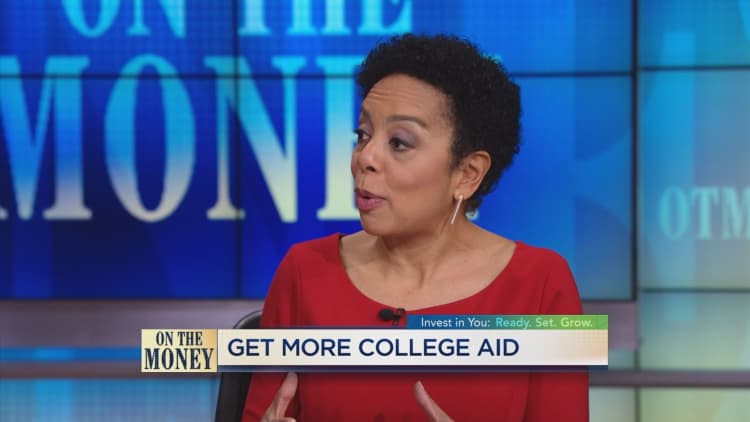
For every parent like Felicity Huffman and Lori Loughlin who tried to buy their kid's way into college, there are a slew of others who can barely afford it.
"We are in that funny trap where we don't qualify for aid but we also don't have $70,000 a year to spend on private college," said Robin Coccomo, 42. Her oldest son, Paul, will be a freshman in the fall and she also has two other children not far behind.
"What I offer him, I also want to be able to offer the other two."
Paul Coccomo, 18, wants to study engineering and has already been accepted at eight institutions for next year, including the University of Connecticut in his home state. He is still waiting to hear from seven more colleges, one of which is MIT — his top choice.
However, all of those schools are expensive. The cost for tuition plus room and board at a four-year private school hit $48,510 for the current school year, according to the College Board. At public four-year institutions, the total was about half of that, though still $21,370 on average.
To bridge the gap, about two-thirds of all full-time students receive aid, which can bring the net price way down. "If we can negotiate a little bit of a bump in aid, it would make it manageable," Coccomo said.
Schools are often receptive to appeals for more aid; they just don't advertise it, experts say.
"We've had students increase their aid by as much as $120,000," said Zack Perkins, the co-founder of CollegeVine, a college admission guidance site.
"That initial aid offer is the starting point," he said. "It's more like an opening bid."
The best way to make such a request is to write a letter to the school's financial aid office, Perkins advised.
Review the letter
But first, make sure you understand the financial aid award letter — particularly the difference between scholarships and loans, whether those funds are renewable for all four years and if they come with contingencies such as maintaining a certain grade point average.
Then, frame the conversation depending on the type of aid you are seeking. There are need-based appeals and merit-based appeals, said Davin Sweeney, a director of college counseling at Collegewise in New York.
If there are need-based issues beyond what was noted in the financial aid paperwork, such as an older sibling who moved back home after college, care for elderly grandparents, increased health-related expenses or the loss of a job, those should be explained to the school and documented, if possible.
Alternatively, if the financial aid packages from other, comparable schools were better, that is also worth bringing to the school's attention in an appeal for more merit aid.
You'd be surprised at how much additional aid you can secure.Zack Perkinsco-founder of CollegeVine
"Universities are very open to these conversations, if presented in the right way," Perkins added. "You'd be surprised at how much additional aid you can secure."
Roughly a third of appeals are honored at most schools, according to Robert Franek, The Princeton Review's editor-in-chief and author of "The Best Value Colleges."
With prices steadily rising, "the college understands how important the cost of attendance is and they want to make it work," Sweeney said.
These days, 7 in 10 seniors graduate with debt, owing about $30,000 per borrower, according to the most recent data from the Institute for College Access & Success. (Tack on interest and that balance can balloon over time.)
All in, student debt reached a record $1.5 trillion last year, according to the Federal Reserve.
In a recent poll, the majority of students and parents said that, when it comes to college, their biggest concern was the "level of debt to pay for the degree." Ninety-nine percent of respondents also said financial aid would be somewhat, very or extremely necessary, according to The Princeton Review's College Hopes & Worries survey.
Before taking on such a significant financial commitment, really consider what you can comfortably afford, Sweeney advised.
"It's an incredibly personal decision for every family to gauge whether something is worth it," he said. "That goes for the milk you buy at the store to your college decision."
A degree that will leave you with six figures of student loan debt "is definitely approaching too much," he added.

More from Invest in You:
How to compare college aid letters — and lobby for more money
Here's how $50,000 in student debt becomes nearly $100,000
These elite private colleges could be surprisingly affordable
Disclosure: NBCUniversal and Comcast Ventures are investors in Acorns.







